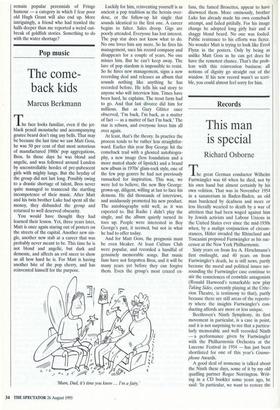Pop music
The come- back kids
Marcus Berkmann
The face looks familiar, even if the jet- black pencil moustache and accompanying goatee beard don't ring any bells. That may be because the last time we saw Matt Goss, he was 50 per cent of that most notorious of manufactured 1980s' pop aggregations, Bros. In those days he was blond and angelic, and was followed around London by uncontrollable hordes of pre-pubescent girls with mighty lungs. But the heyday of the group did not last long. Possibly owing to a drastic shortage of talent, Bros never quite managed to transcend the startling incompetence of their music. After Matt and his twin brother Luke had spent all the money, they disbanded the group and returned to well deserved obscurity.
You would have thought they had learned their lesson. Yet, three years later, Matt is once again staring out of posters on the streets of the capital. Another new sin- gle, another new stab at a career that was probably never meant to be. This time he is not blond and angelic, but dark and demonic, and affects an evil sneer to show us all how hard he is. For Matt is having another bite of the pop cherry, and has reinvented himself for the purpose. Luckily for him, reinventing yourself is as ancient a pop tradition as the heroin over- dose, or the follow-up hit single that sounds identical to the first one. A career begins to falter. Sales droop. Gigs are poorly attended. Everyone has lost interest. The pop star does not know what to do. No one loves him any more. So he fires his management, sues his record company and disappears for a couple of years. No one misses him. But he can't keep away. The lure of pop stardom is impossible to resist. So he hires new management, signs a new recording deal and releases an album that sounds nothing like anything he has recorded before. He tells his sad story to anyone who will interview him. Times have been hard, he explains. The trout farm had to go. And that last divorce did him for millions. But as Gary Glitter once observed, 'I'm back, I'm back, as a matter of fact — as a matter of fact I'm back.' The star is reborn, and everyone loves him all over again.
At least, that's the theory. In practice the process tends to be rather less straightfor- ward. Earlier this year Boy George hit the comeback trail with a ghosted autobiogra- phy, a new image (less foundation and a more muted shade of lipstick) and a brand new album in 1970s' glam-rock style, one of the few pop genres he had not previously ransacked for inspiration. This was, we were led to believe, the new Boy George: grown-up, diligent, willing at last to face his demons. He did thousands of interviews, and assiduously promoted his new product. The autobiography sold well, as it was expected to. But Radio 1 didn't play the single, and the album quietly turned its toes up. People were interested in Boy George's past, it seemed, but not in what he had to offer today.
And for Matt Goss, the prognosis must be even bleaker. At least Culture Club were popular, and recorded a handful of genuinely memorable songs. But music fans have not forgotten Bros, and it will be many years yet before they can forgive them. Even the group's most crazed ex- 'Mum, Dad, it's time you knew ... I'm a fairy.' fans, the famed Brosettes, appear to have disowned them. More ominously, brother Luke has already made his own comeback attempt, and failed pitifully. For his image change he adopted long girly hair and a shaggy blond beard. No one was fooled. Public resistance to his efforts was fierce. No wonder Matt is trying to look like Errol Flynn in the posters. Only by being as unlike Matt Goss as he can get does he have the remotest chance. That's the prob- lem with this reinvention business: all notions of dignity go straight out of the window. If his new record wasn't so terri- ble, you could almost feel sorry for him.


















































 Previous page
Previous page